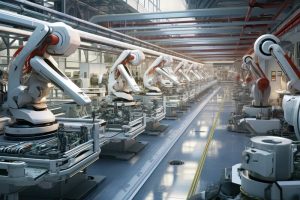In the contemporary era of modern manufacturing, the integration of advanced technologies is reshaping the way products are conceived, designed, and produced. One such transformative force is robotics, which is pivotal in revolutionising manufacturing processes across industries.

image of *clean hightech robot working on a assembly line, clean white factory*, sunlight, clean, bright, futuristic, high resolution –ar 3:2
The Role of Robotics | img via rawpixel
Precision and Efficiency
Robotics in manufacturing ensures unparalleled precision and efficiency. Automated systems, equipped with sensors and programmed algorithms, execute tasks with a level of accuracy unattainable through traditional methods. This not only enhances the quality of products but also accelerates production cycles, as evidenced by the success of lubrication companies in Sri Lanka the likes of McLarens Sri Lanka.
Enhanced Safety Measures
Safety is paramount in manufacturing, and robotics contribute significantly to creating a secure working environment. Robots take on tasks that pose risks to human workers, such as handling hazardous materials or operating in extreme conditions. This not only protects the workforce but also reduces workplace accidents.
Flexibility
Modern manufacturing demands flexibility to meet diverse consumer needs. Robotics, through advancements like machine learning and artificial intelligence, offer unparalleled adaptability. Automated systems can swiftly adjust to changes in production requirements, accommodating variations in product specifications without prolonged reprogramming.
Cost-Efficiency and Scalability
While the initial investment in robotics may seem substantial, the long-term benefits are compelling. Automated processes minimize errors, reduce waste, and optimize resource utilization, resulting in significant cost savings over time. Additionally, as technology advances, scalability becomes more feasible, allowing manufacturers to adapt and grow without exponential increases in labor costs.